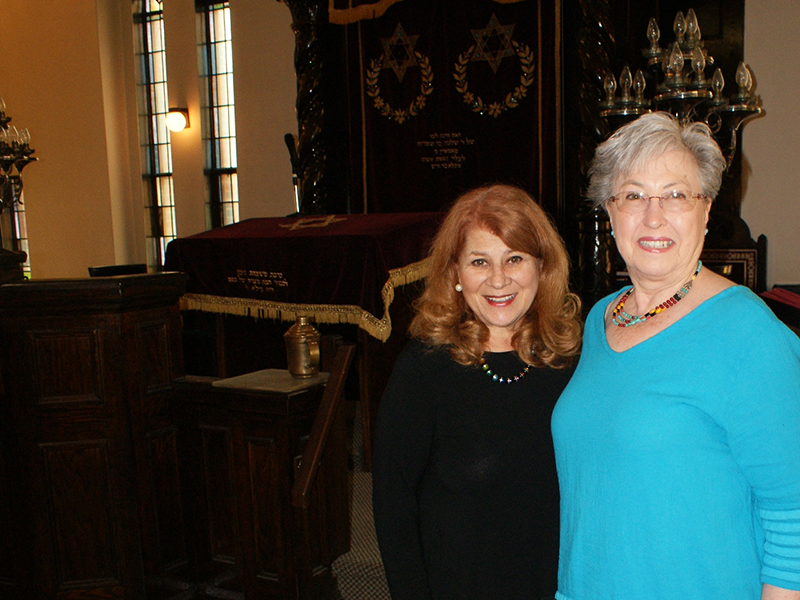The only full-time liberal synagogue in Ontario’s Niagara Region hopes a new marketing effort will help it avoid the fate of other small town shuls across the province.
Dubbed “Destination Simcha,” the initiative by Congregation B’nai Israel in St. Catharines, Ont., aims to sell the small Conservative congregation’s 93-year-old sanctuary in the heart of wine country as an alternative to high-priced and busy Toronto venues, for weddings, bar and bat mitzvahs and other celebrations.
“When I belonged to a large congregation in Toronto, you had to book your celebration five years in advance and sometimes had to share the date with another family,” said B’nai Israel board member Ellaine Feferman. “Here, we have a wonderful facility that’s hardly ever used for simchas. Here, give us two weeks and you can likely have any date you want.”
While B’nai Israel’s leaders insist the congregation isn’t in danger of closing any time soon, they see the demographic trends – including lower synagogue attendance overall and a community where the age range skews to seniors – and are acting now to counter them.
“We’re certainly not on our last legs. We are healthy, but we could be healthier,” said board member Charmian Entine, chair of the congregation’s facilities committee. “This is still a busy place and nobody has to go out looking for people to make up a minyan.”
B’nai Israel has a current membership of 150 families from a Jewish population in the area of 1,375 people in 2011 (the last year for which reliable statistics are available). That’s actually up from 1,125 people in 2001 and 1,295 in 1991.
READ: NIAGARA REGIONAL COUNCIL CONDEMNS BDS
B’nai Israel has a long tradition of renting out its 200-seat auditorium and meeting rooms to non-Jewish community groups, as many synagogues do. Recent uses have included an all-candidates meeting during the provincial election.
Even the kitchen is rented to local Bagel Oven entrepreneur Jess Bretzlaff. The sanctuary, however, has remained off the market.
“We just asked ourselves one day why we weren’t renting out the sanctuary, as well,” Feferman said.
Demand for the 450-seat sacred space has been slow so far – one event has been held and another is scheduled – a pace Entine and Feferman blame on their limited ability to get the word out. A single advertisement in a community newspaper, for example, consumed their entire marketing budget.
They are currently relying on the congregation to spread the message through word of mouth. In the future, they hope to form a formal alliances with a winery or Niagara’s tourism authority.
Events in the sanctuary do require adherence to some strict rules, including a ban on interfaith marriages.
Give us two weeks and you can likely have any date you want.
– Ellaine Feferman
“We would rent out the meeting rooms for non-Jewish functions, but mixed-marriages are not considered as appropriate for our Conservative shul,” Entine said. “Marriages have to be between two Jewish people. Gay marriages are welcome, as long as both partners are Jewish.”
In addition, children having their bar or bat mitzvah have to meet the halakhic definition of Jewish. Non-Jewish family members are welcome on the bimah, but would not be offered Torah honours. Also, any food brought in has to meet kosher standards.
Fees for the service vary with the number of facilities required, but the main auditorium can be rented for $400, a price that includes coffee and cookies after the meeting.
If the Destination Simcha campaign takes off, B’nai Israel’s leaders hope it will help them head off the double tsunami of shrinking membership and expensive buildings that have overwhelmed other small synagogues.
In 2000, for example, a Reform congregation in St. Catharines called Temple Tikvah merged with another Reform group in Niagara Falls, to form Congregation B’Nai Tikvah, which holds services monthly. In the mid-1980s, Oakville’s Sharei-Beth El synagogue was formed out of a merger between Beth El and a synagogues in Burlington. Brantford, where the 2011 National Household Survey shows a Jewish population of only 60, lost its Congregation Beth David in 2001. In 2016, Shaar Shalom in Thornhill closed and, more recently, two York Region congregations, Temple Kol Ami and Neshamah Congregation, announced a plan to merge.
Declining membership has been a common theme of the closures and mergers.
B’nai Israel’s leaders hope efforts such as Destination Simcha will help them hold the line, while Niagara’s Jewish population grows – something Entine sees as an inevitable result of the region’s changing economy and a flow of people who have been priced out of the Toronto housing market.
“As the economy changes, Jews do come,” said Entine. “I’m really anticipating that in the future, this won’t be entirely an aging community.”
